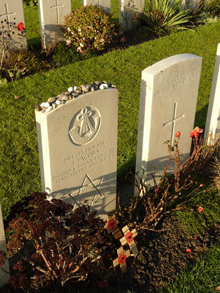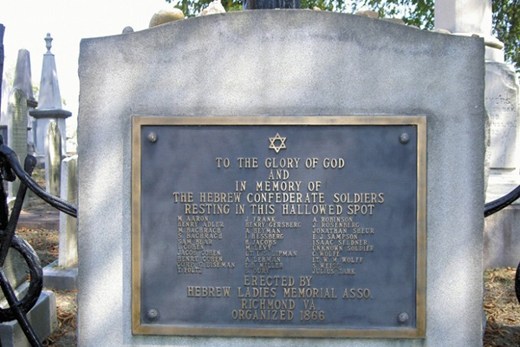Jacob Wright has laid out for himself a task that embraces one of the highest values of the Jewish tradition, and of many faith traditions: the task of remembering.
Wright studies remembering through the lens of war commemoration, a practice that he says is one the most important political means by which communities construct and negotiate their collective identities.
Wright most often looks through the lens of peripheral groups in societies. "From my new home in the South one of the examples I like to use is a society called the Hebrew Ladies Memorial Association, founded immediately after the Civil War" says Wright.

Grave of a WWI Jewish soldier from England at a cemetery in Passchendaele, Belgium.
"Their job was to tend to the graves of Confederate war dead, their sons who had died for the Confederate side. They did this in order to insist that they truly belonged to South," not stuck between sides, as larger society would try to portray them.
Throughout American history, ethnic and other minority groups have sought to define themselves in relation to the larger society in the way they commemorate their group's war dead, Wright says.
After World War I, the phenomenon also spread throughout Europe, when war memorials popped up everywhere, as did a kind of politicized commemoration "with everyone trying to say 'we did our job, and we actually did more than our share.'"
That last point, that the cost of war often is paid disproportionately by minorities, "continues to play a role in terms of LGBT rights, rights of women and others' contributions to major war efforts in America and other societies," says Wright.
"There's a practical ethics on display in terms of how one calls attention to the sacrifice and service of excluded groups and what these excluded groups themselves do to make their voices heard, their presence felt."
Wright comes to the study of war and commemoration from his role as a scholar of Hebrew Bible at Emory's Candler School of Theology and faculty member of Emory's Tam Institute for Jewish Studies. His first book, "Rebuilding Identity: The Nehemiah Memoir and Its Earliest Readers" won the 2008 Templeton Award for Theological Promise for its exploration of the composition history of what is the earliest Jewish memoir (late 5th century BCE).
Wright's exploration of ancient texts has proven to be a springboard for a wide range of contemporary issues. He teaches a course at Candler called "Texts of Terror," which deals with the most difficult and at times horrifying passages in the Hebrew Bible, such as the story of Jephthah, who sacrifices his daughter as a burnt offering to God to fulfill a rash vow.
"Instead of evading such accounts, we are facing them head-on," he says of the class. "Together we develop strategies for placing them in historical context, as well as addressing the problems they pose for the students' own faith communities."
It is in those difficult texts and issues that Wright has come to see as most illuminating for him, and for others who want to take understanding of the human condition to the next level.
"I think study of the commemoration of those who died in war deserves to be front and center in the humanities because it involves so much of our history, politics, sociology, religion, all kinds of fields," Wright says.
Work receives funding from National Endowment for the Humanities
That's why the National Endowment for the Humanities is interested in the work and is funding Wright's two forthcoming book-length projects examining these issues.
"In the Jewish tradition there's an obligation to remember and not to forget. If you exclude someone, it's as if you erased their existence, their history. It’s hard to imagine something more awful than that," Wright says.
"Physical war memorials, as well as other projects of commemoration, are there to remind us that minority groups have fought and died in disproportionate numbers," says Wright. "What's at stake is belonging and civil rights and honor."

